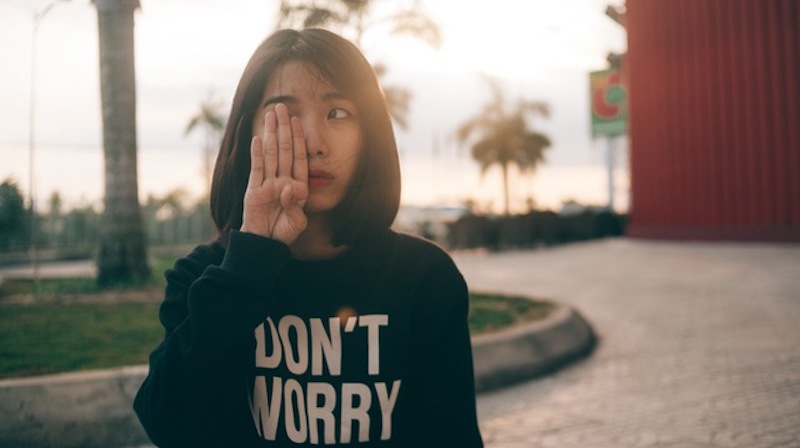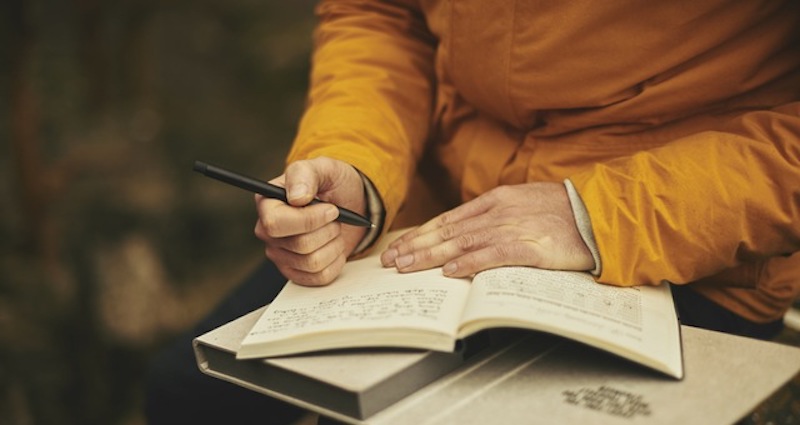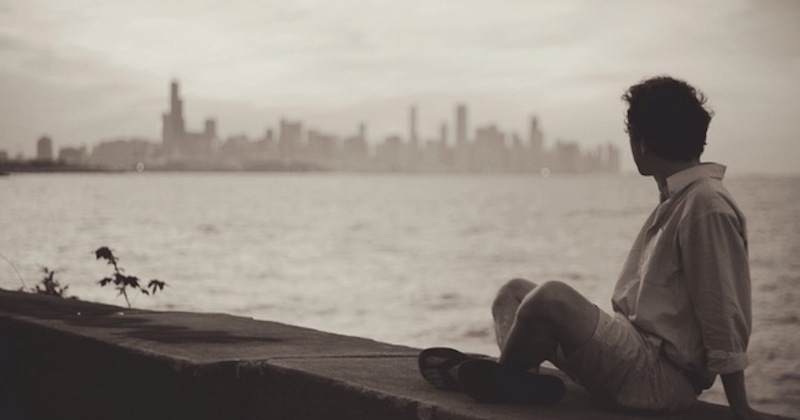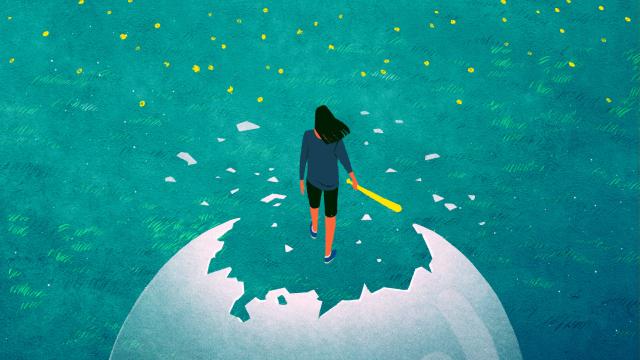You know how important it is to break out of your comfort zone, say yes more often and allow yourself to be vulnerable. But what if that vulnerability makes you so anxious you find it hard to function? The key is learning to embrace vulnerability without allowing it to take over.
Illustration by: Angelica Alzona. Photos by: Pham Khoai, unsplash, unsplash.
When I first started writing about my own personal finances over at Get Rich Slowly, I’d literally start shaking the morning a new post went up. My personal thoughts, feelings and fears were out there for any stranger on the internet to see, and the internet is a scary place. I opened myself up to criticism, judgement and mockery. On those days, I found it hard to focus on work because I kept wondering what people would think. I poured over every comment, analysed it and took it way too personally, good or bad. Vulnerability consumed me.
Vulnerability Is Important, But Not If It Stresses You Out Too Much

Even though blogging made my stomach churn, I kept doing it because I liked writing, it helped me vent and it led to new opportunities. When you understand why vulnerability is so important in the first place, you’ll be more motivated to embrace it.
Think about your deepest relationship – whether it’s your spouse, a good friend, your parents or a sibling. Chances are, you’ve shared some vulnerable moments with this person. For the first time in almost 10 years, I recently got into a fight with a friend. It wasn’t pretty, but it strengthened our friendship. I learned more about how she functions, she learned what makes me tick, and that empathy made us closer and more comfortable with each other. We went from OK friends to really good, ride-or-die buddies for life. Granted, you don’t need conflict to get closer, but it forces you to open up about how you feel and be honest, which can be vulnerable. Either way, vulnerability isn’t just part of a meaningful relationship, it’s crucial to one.
Vulnerability also challenges your confirmation bias. It can be uncomfortable to ask questions, express your opinion or talk about your emotions with people. You expose yourself to their criticism and judgement, but you also expose yourself to answers and opposing views, which is a lot more fulfilling than stagnating in the comfort of what you already know. A little stress and anxiety are a normal part of leaving your comfort zone.
Breaking out of your comfort zone makes you feel vulnerable, but that feeling works in your favour. It improves your performance, according to Yerkes-Dodson Law. Psychologists Robert M. Yerkes and John D. Dodson explained that a state of comfort equals steady performance, but if you want to improve performance, you need some amount of stress and anxiety. So when you feel anxious, exposed and vulnerable, you’re growing.
On the other hand, as Yerkes and Dodson explained, too much anxiety will make you too stressed to be productive. If vulnerability sends your stress into overdrive, your goal is to find your “optimal anxiety”.
Set Realistic Goals to Hedge Your Anxiety

Last year, I made some lofty, uncomfortable resolutions that tested my own comfort with being vulnerable: Ask for more money, be more honest with people, face impostor syndrome and break out of my routine. It was an overwhelming list to accomplish at once, so I broke up these resolutions up into smaller, digestible goals.
Blatant honesty comes easy for some people, but I have a hard time with it. So I made it my goal to be brutally honest with someone at least once a month. When a new friend asked me to go see a bad movie, I wanted to say I had other plans, but instead, I told her I really hated the movie.
Of course, after I said it, I realised it wasn’t a big deal. I build these things up in my head and that causes more anxiety than anything.
This realisation made it easier to stick to my resolution for the rest of the year, but it might not have happened if I didn’t set a clear goal. I was focused on crossing that goal off my list, which motivated me to tell her the truth. Without a goal, I probably would have told her a white lie without giving it any additional thought. Second, the goal allowed me to focus on something other than her reaction, which is why people tell white lies to begin with. We’re afraid of how people will react to the truth. I looked at the situation from the perspective of getting something done, which took off the pressure.
In most cases, once you do something scary, you realise it’s not as bad as you thought – it was just the anticipation that frightened you more than anything. Setting a goal can help you get past that anticipation and feel in control of your vulnerability.
Partner Up With a Friend

You can also encourage yourself to do more vulnerable things by finding a friend who embraces discomfort. I used to hate networking events, so whenever I was invited to one, I would ask a good friend of mine to go with me – she was used to mingling and work talk. I still felt anxious when I had to introduce myself to new people, but it helped to have a familiar person there to anchor me. I also fed off of her confidence and charisma and didn’t take the event so seriously.
You probably have friends who are pros at embracing vulnerability, too. They constantly put themselves out there, try new things and live for adventure. I try to make as much time as I can for those friends, because they’re the ones who inspire me to do stuff, encourage me to get out of the house and support me when I want to take a leap.
Maybe it’s a networking thing, or stand-up comedy, or surf lessons. Whatever the activity, having a friend by your side makes an uncomfortable thing a little less anxiety-inducing so you can get the most out of it. Better yet, if you have a friend who can introduce you to new, positive experiences, it helps to say yes to that friend more often. Of course, if you have issues with anxiety, you want that friend to understand those issues, too, so they don’t hurt more than they help.
Practise Mindfulness

I hate interviews. Whether I’m being interviewed or I’m interviewing someone else or it’s just a job interview, I absolutely dread them. I worry I’ll say something stupid, ask dumb questions or bomb in general. I constantly think about the interview for weeks leading up to it until it’s finally over.
I still dread interviews, but I’ve gotten better at handling the anxiety that accompanies them. Mindfulness has helped more than anything.
If you’re unfamiliar with the term, mindfulness is simply focusing on what’s going on around you, rather than being distracted or unengaged. Numerous studies, including this one published in JAMA Internal Medicine, have found that practising mindfulness can help reduce anxiety and depression. A few of the ways I practise it:
- Meditation: Mindfulness meditation seems to be a cure-all these days, but it really does help. Sometimes I use an app (Breathe, free on iOS and Android), but mostly I just set a timer for five minutes to sit and breathe.
- Reminders: I set reminders to focus on different activities. For example, I use the tomato-timer app while I work to focus on 20 minutes at a time. The app reminds me to take a break, then it reminds me to refocus on my work. I do the same thing with dinner. I remind myself to focus on the process, take it one step at a time and stay engaged. It might seem silly, it’s just dinner after all, but it helps me stay present with one more task in my life, which helps me stay mindful in general.
- Journaling: For me, journaling serves as a daily check-in. I can release my anxieties so they don’t sneak into every other activity throughout the day. I get them out of my head and on paper, where I sort them out. And then I can focus on the task at hand.
When I feel anxious, I’m scared of what might happen, anticipating some future event. When I’m focused on and engaged with the present, though, I distract myself from the anxiety that comes with vulnerability. Even though my knee-jerk reaction is to avoid interviews altogether, I try to say yes and remember that mindfulness will curb a lot of the stress.
Finally, keep the momentum going. The longer you stay in your comfort zone, the harder it is to pull yourself out of it – that’s inertia in action (or inaction, if you will).
When you get used to breaking out of your comfort zone, the whole process becomes less scary. Yes, you’ll still feel vulnerable, but your vulnerability, anxiety and stress will stay at optimal levels: Enough to benefit you, but not so much that it keeps you from ever wanting to leave your comfort zone again.
You may have noticed Lifehacker Australia looks different. We’re keen to hear your thoughts on the redesign. Share your feedback here!

Comments